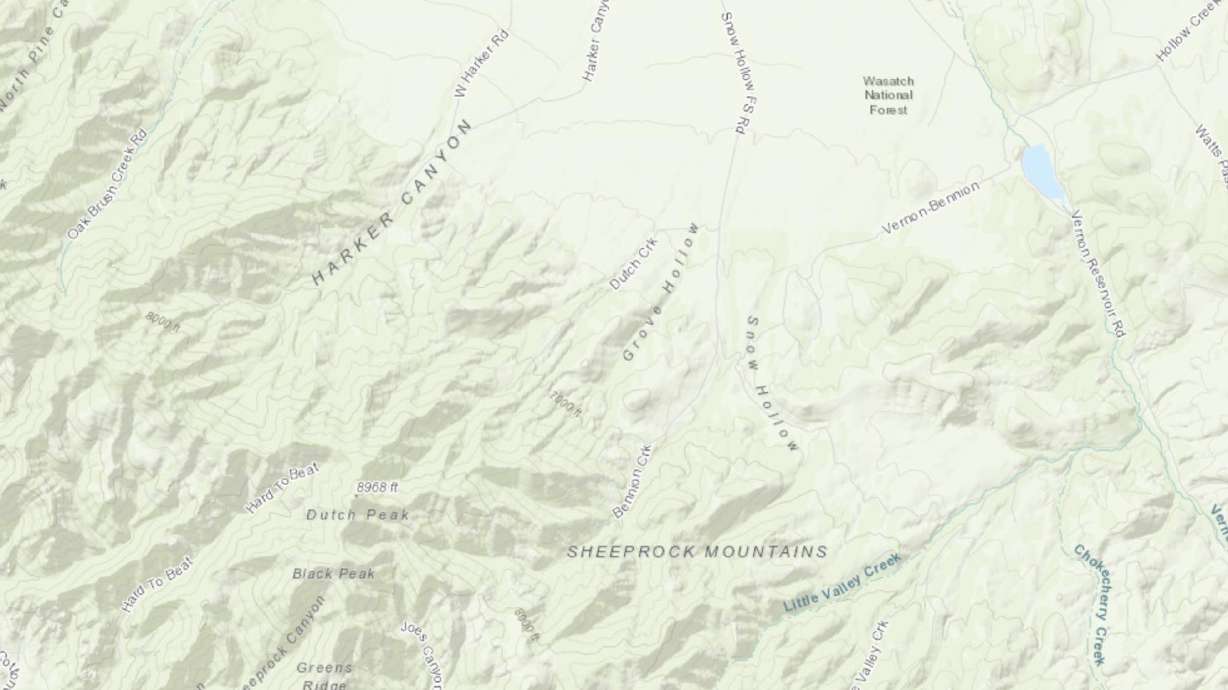Estimated read time: 4-5 minutes
This archived news story is available only for your personal, non-commercial use. Information in the story may be outdated or superseded by additional information. Reading or replaying the story in its archived form does not constitute a republication of the story.
PINE RIDGE RESERVATION, S.D. — The "r word," as Chase Iron Eyes calls it, may be innocuous to some.
He, many more Native Americans and others, though, say the word is offensive and they're pushing to change the name of a Utah peak that employs an iteration of it, Red Skin Knolls in the Wasatch National Forest in Tooele County. It's one of a dozen place names across the country a coalition of groups, including the Lakota People's Law Project, which Iron Eyes leads, want to change as part of a push tied to Black History Month.
"They just come from a different time frame," said Iron Eyes, speaking by phone from his home on the Pine Ridge Reservation in South Dakota. "The idea is to get American people involved in creating a different cultural reality."
The other names under fire by Iron Eyes' group, Black Lives Matter Greater New York and People, Not Mascots, employ derogatory terms for Black people, Asians and Hispanics. Those involved are pushing U.S. Interior Secretary Deb Haaland, the nation's Derogatory Geographic Names Task Force and whatever other entities may be involved in such matters to change the names.
That the names in question remain is "a silent reminder ... that, hey, (racism) is still here and it's not going anywhere," said Chivona Newsome, cofounder of the New York Black Lives Matter group.
Iron Eyes understands some may question such initiatives. The Utah site identified, remote and not even appearing on a Utah Department of Natural Resources map, is hardly a high-profile location. "Some might call it a culture war. I see the radical right calling it a woke war," he said.
However, he believes the language, even if it came from a different era, even used in an out-of-the-way place, has a demeaning effect. Redskin as originally formulated referred to the scalps of Native Americans collected in years past by bounty hunters, according to Iron Eyes.
"The power of naming creates realities, creates dynamics between the oppressed and the oppressor, the colonizer and the colonized," he said in a press release. "How can we, in good conscience, let these names exist in 2024? What does that teach our young ones? What does that say about our culture?"
In 2022, the U.S. Board of Geographic Names approved renaming of nearly 650 sites and locations, including 50 in Utah, that used what the U.S. Department of the Interior refers to as "the sq-word," a derogatory word typically used for Native American women. Now, the foes of use of the racially charged language are pushing to raise awareness about the issue, to generate feedback on other place names using offensive language around the country and to eliminate them.
Most notably, what was formerly known as Squaw Mountain/Peak in Utah County was renamed Kyhv Peak.
"We're not free until we're all free," said Newsome.
Red Skin Knolls in Utah is 7,087 feet high, according to Peakery, an online compendium of mountain peaks around the country geared to climbers. It's part of the Sheeprock Mountains, a small range "surrounded by a diverse landscape of deserts and valleys," according to PeakVisor, a navigation app.
Other place names singled out by the three groups — language alert for readers — include Big Negro Creek in Missouri, Darky Knob in Kentucky, Red Skin Run in Kentucky, Negro Foot in Virginia, Pickaninny Buttes in California, Redskin Brook in Indiana, Wetback Tank in New Mexico, Dead Indian Pass in Wyoming and Chinamans Canyon in Colorado.
Anna, a small town in Illinois, is also included as the name became an acronym for "Ain't No 'N-words' Allowed," a reference to the locale's status long ago as a "sundown town," where people of color might not be safe after dark. Devil's Tower in Wyoming is also on the list since the site has "deep significance" to many Native Americans.
"It's highly inappropriate that this sacred site — so meaningful to the cultural histories and spiritual traditions of the first inhabitants of this land — should carry a name alluding to an evil originating from a book of non-Native spirituality," reads the Lakota People's Law Project website.
Jesse Phelps, communications director for the Lakota People's Law Project, which is based in Bismarck, North Dakota, said the groups involved in the new initiative are trying to muster support from Latino, Asian and other groups. "We really want this to be a coalition effort that tackles these names from every side," he said.
Organizers are hoping to spur thousands of messages of support to the U.S. Department of Interior and affiliated groups that address naming issues this month, though Phelps suspects actual renaming efforts would likely take longer.









